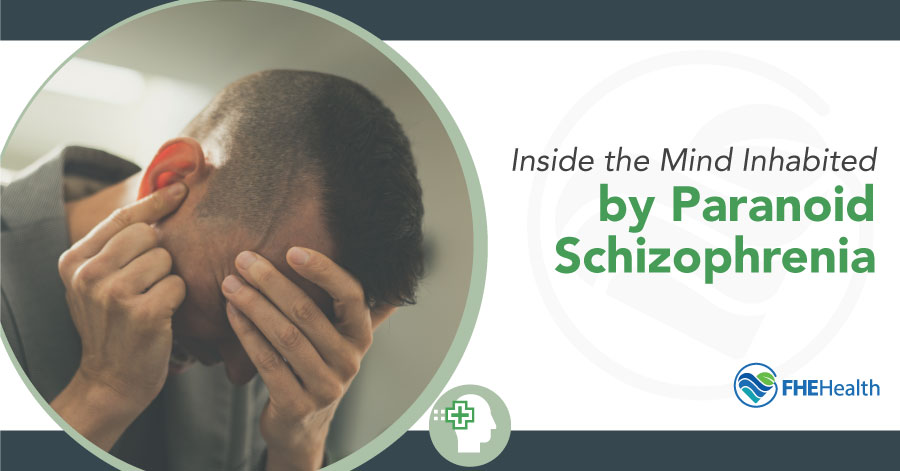
What Is Paranoid Schizophrenia?
Properly referred to in the DSM-5 as schizophrenia paranoid type, paranoid schizophrenia is a mental disorder characterized by delusions, hallucinations, disorganized speech, grossly disorganized or catatonic behavior and negative symptoms.
On the surface, many people cannot truly grasp what living with the disease is like. A crude layman’s perception is that paranoid schizophrenia simply means people hear voices or are incorrectly labeled as crazy. On the contrary — these people are suffering from a pervasive and disturbing thought disorder, which they often attempt to alleviate by self-medicating with drugs or alcohol.
Symptoms often present in an individual’s early 20s, with the first behavioral changes such as isolation and poor hygiene noticed by family and friends. Another early symptom is a person failing to fulfill basic commitments, such as school, work and family obligations.
As symptoms escalate, they may present in a far more flamboyant fashion, such as responding to internal stimuli like auditory or visual hallucinations. In a more severe presentation, a person may interact with their delusional paranoia, putting themselves or others in danger of harm and generally appearing unwell to those not suffering from the disease.
Diagnosing Schizophrenia
To be diagnosed with schizophrenia, an individual needs to be properly assessed by a licensed mental health professional, such as a psychiatrist or a psychiatric nurse practitioner. This often occurs in an inpatient hospital setting, although it can take place in an outpatient setting if people are vigilant enough to recognize the need for assessment.
During the assessment, clinicians attempt to build rapport while evaluating the individual’s current presentation and any recent or remote history. They also evaluate daily living activities such as sleep, hygiene and appetite. Clinicians check for manifestations of positive disease symptoms, such as hallucinations, paranoia or delusions. Additionally, they’ll assess for negative symptoms such as blunting of affect, poverty of speech and thought, apathy and anhedonia.
How to Deal With a Schizophrenic Problem
Just as with any illness, a paranoid schizophrenic fares a lot better when they have the support of family and friends. If you or a loved one has been recently diagnosed, it’s important to understand that schizophrenia is a lifelong illness that often involves periods of relapse, remission, hospitalization and medication changes.
Caring for or living with a schizophrenic can be complicated and emotional, often taking a toll on family, friends, and the individual affected. Therapeutic intervention for schizophrenia requires a collaborative approach involving you or your loved exploring medication, therapy and case management options.
How Substance Abuse Affects Schizophrenia
In a study completed by Baigent et al., in a sample size of 53 individuals with schizophrenia as well as major substance abuse, most individuals began abusing substances to relieve dysphoria, depression and anxiety. Alcohol and cannabis were most frequently used due to their accessibility, although amphetamines and other stimulants were the drug of choice to reduce feelings of depression. Due to their elevating effect, drugs like meth and cocaine can amplify the feelings of a user’s paranoia.
The same study showed that participants were willing to view themselves as drug dependent and saw it as more socially acceptable to have a drug problem than a psychiatric condition. Some of the study’s participants stated that substance abuse “created a sense of identity and belonging to a group.”
In the above study, an open-ended question survey showed individuals continued to use marijuana as a means to treat depression and anxiety and participate in social interactions.
Studies have concluded that marijuana use correlates to an increased risk of schizophrenia, a higher incidence of inpatient hospitalization and a more severe presentation of the illness than seen with nonusers. Substance abuse can also increase the prevalence of violent crimes, both of which contribute to the stigma of mental illness. This stigma is so widely felt that those with the illness often have difficulty asking for help.
Schizophrenia Stories — “To the Top of the Mountain”
Stuart Baker-Brown shares his experience struggling with symptoms for five years before receiving a formal diagnosis of paranoid schizophrenia in 1996. Prior to his diagnosis, Brown had frightening beliefs that the KGB, the secret police of the Soviet Union, were out to capture him. He promptly hid away from the world, ashamed and living with his paranoia.
Before his formal diagnosis, he stated that he experienced a depression so deep that “Suicide began to be a real option for me. I could see no future and found little cause to stay alive.” Stigma limited him from interacting with the world around him and left him feeling like nothing more than a diagnosis. In 2002, after several trials, he found a medication that suited him well.
In 2003, after working with various available resources, Brown felt able to rejoin the world and climbed Mount Kala Pattar to photograph Mount Everest. After being told he suffered from one of the most severe cases his psychiatrist had ever seen, Brown was able to accept his diagnosis and at the same time refuse the stigma associated with his illness. He refuses to let opportunities be taken from him on the basis of his schizophrenia and has made plans to become the first individual with the disorder to climb Mount Everest.
How FHE Can Help
At FHE Health, we understand the difficulties you face when dealing with mental illness as well as addiction. We provide individualized services for each and every person, including evaluation, medication management, therapy and substance abuse support. We can help you learn to live with your diagnosis of paranoid schizophrenia and without substance abuse. Our innovative Dual Diagnosis Treatment Program helps find the root cause of your illnesses.
If you’re ready to take back control of your life, get in touch with us immediately 24/7, 365 days a year. Call our helpline at (833) 596-3502 to find out more about all of the life-saving treatments available.






